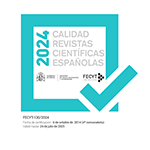Claves para la historia de un cultismo “honesto”. I. Antigüedad y Edad Media
Abstract
Honestum represents one of the most important moral and esthetic terms in the whole latin literature. Starting with its Cicero’s use to traduce to latin the complex greek concept kκαλóν, present in Plato, Aristotle and the stoical philosophers, this paper studies its use by the main christian medieval authors, and, especially, its presence in two of the biggest Aristotle and Plato’s translators, Leonardo Bruni and Marsilio Ficino, and also the impact of both’s works in the diferent values that the term «honesto» took inside the castilian literature. The first part of the paper covers from the Antiquity till the Middle Ages.Downloads
Article download
License
In order to support the global exchange of knowledge, the journal Cuadernos de Filología Clásica. Estudios latinos is allowing unrestricted access to its content as from its publication in this electronic edition, and as such it is an open-access journal. The originals published in this journal are the property of the Complutense University of Madrid and any reproduction thereof in full or in part must cite the source. All content is distributed under a Creative Commons Attribution 4.0 use and distribution licence (CC BY 4.0). This circumstance must be expressly stated in these terms where necessary. You can view the summary and the complete legal text of the licence.








